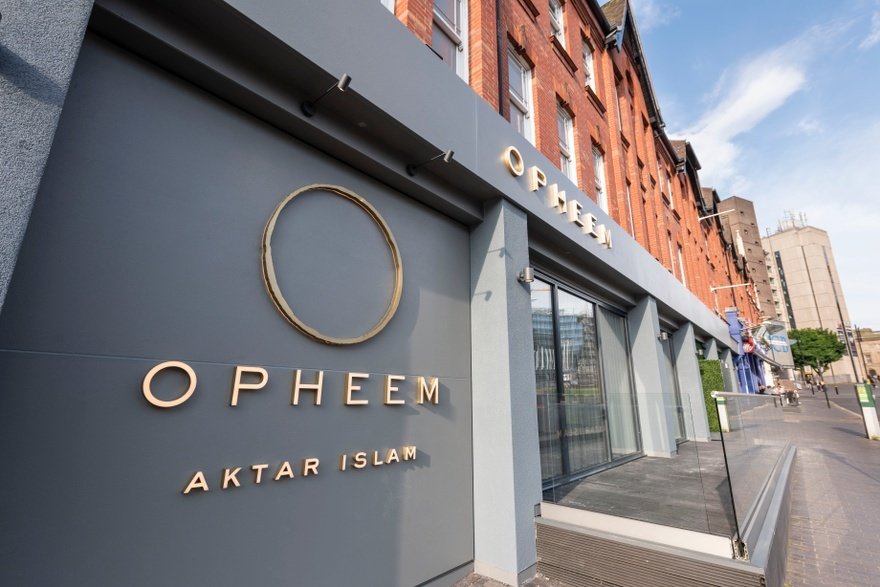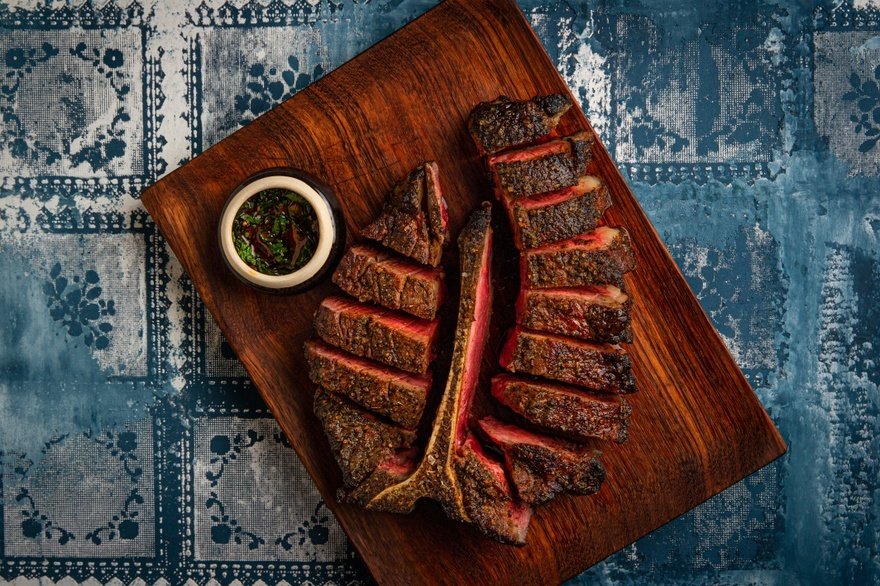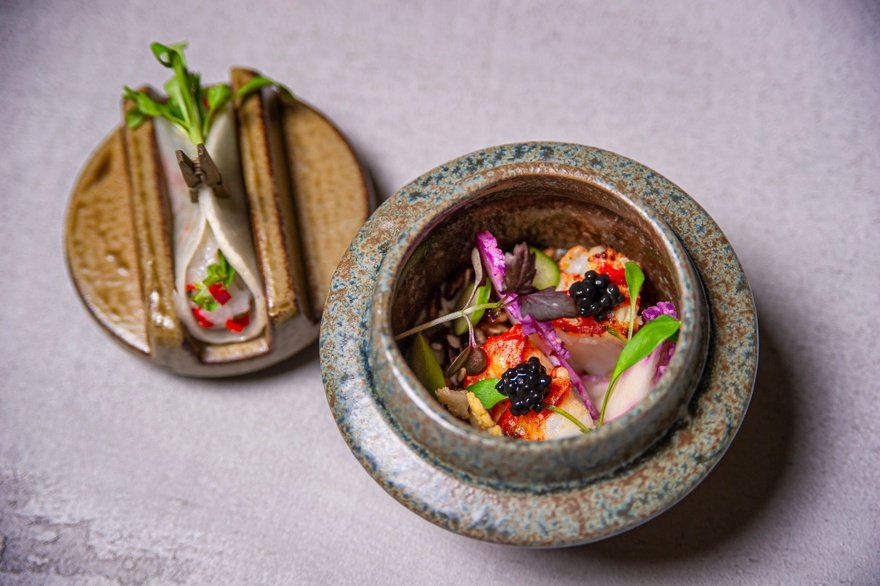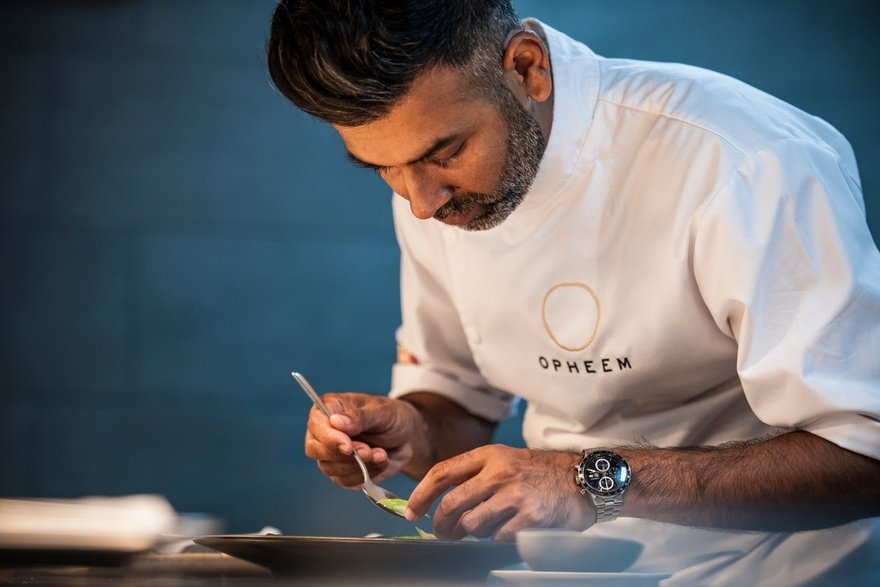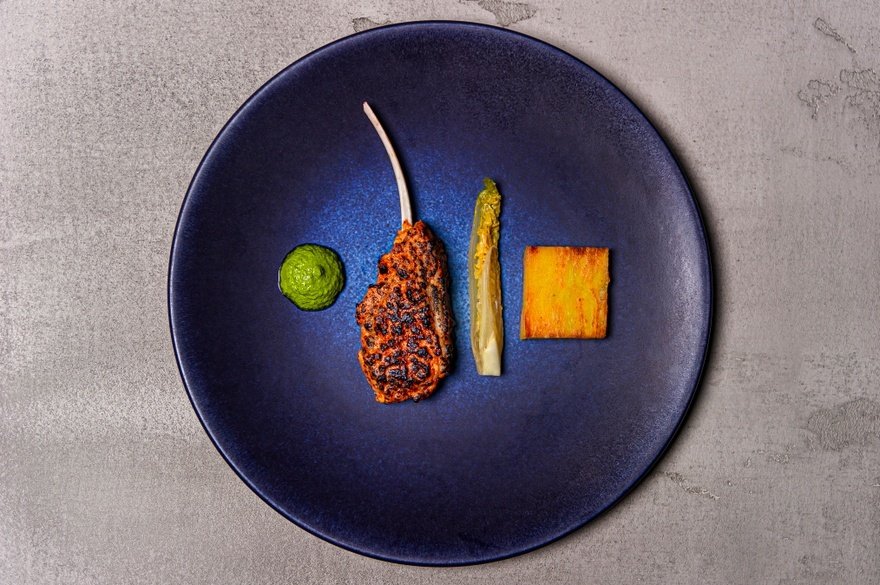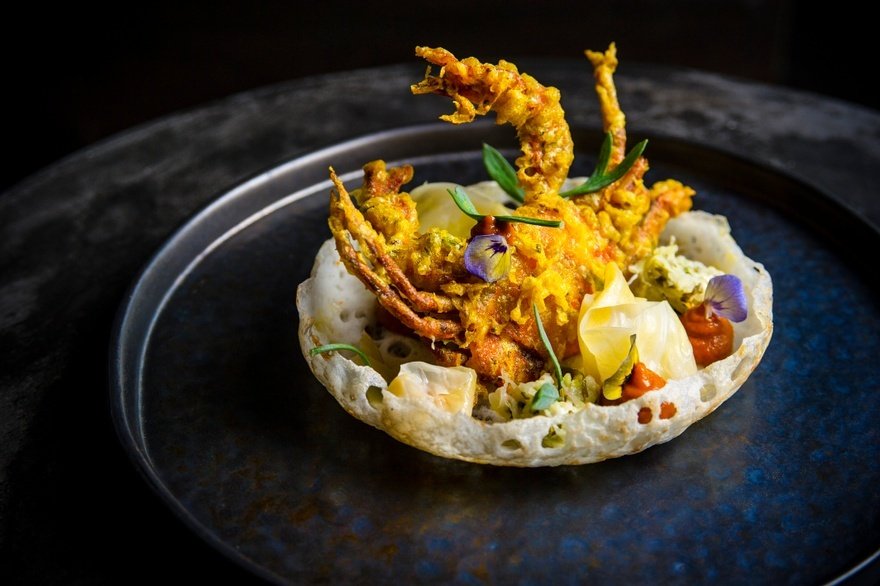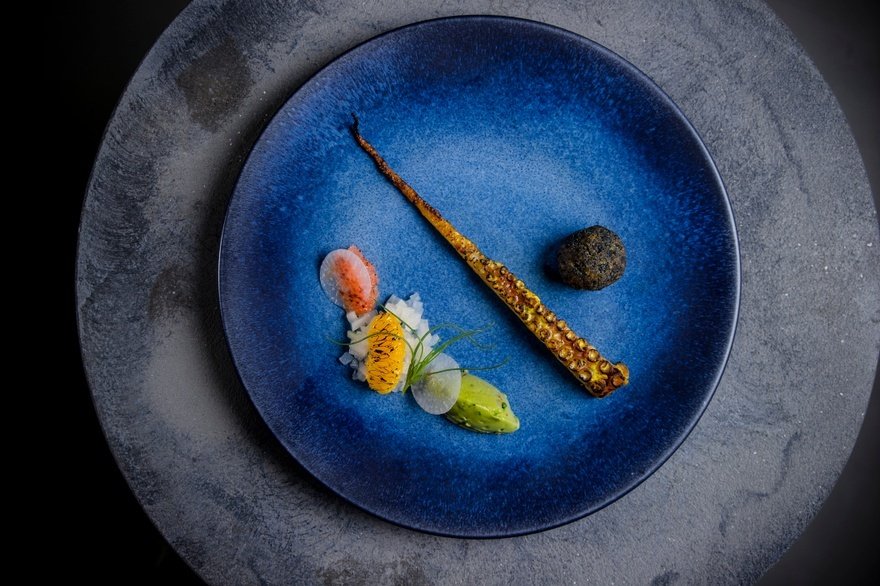Since becoming the first British-born Indian chef to win a Michelin star at his restaurant Opheem, Aktar Islam has become an outspoken flagbearer for the industry, a scholar of 4,000 years of Indian cuisine and the force behind Argentinian, Italian and American restaurants – and soon a hotel – all in his home town of Birmingham. Tom Vaughan pays a pre-lockdown visit.
Aktar Islam has let rip. "How am I greedy and self-serving?" he fumes in his Brummie accent. "I'm the guy who's put four million quid into Birmingham over the last few years! If I was self-serving, I would put that into building apartment blocks! I'd get my money out straightaway and I'd get a return!"
We're sat in plush armchairs in his Birmingham fine-dining restaurant Opheem. The anger isn't in response to anything I've said, but to a week-old Twitter spat that is still rumbling on. "Why would I go into a business with as little as 3% return if I'm greedy and self-serving? Why would I do that – risk it all?"
The cause of his anger isn't about being labelled greedy in response to his tweet, which said that the £2,100 government hospitality grant isn't enough to cover his restaurant's losses. The source of his rage is the misrepresentation of an industry that contributed £133b to the UK economy last year, but that he feels has been thrown under a bus in the pandemic. "It seems hospitality's being blamed for it all. I think, as an industry, we need to be a lot more vocal with the facts."
For Islam, who currently operates Michelin-starred Indian restaurant Opheem and Argentinian steakhouse Pulperia in his home city of Birmingham, those losses stack up to £20,000 a month. This was all while the city was under the government's Tier 2 restrictions. With the country in the second lockdown, the outlook is even bleaker.
Islam is grateful for the support the industry has had, but feels it is nowhere near enough considering how much hospitality contributes to the economy. "The guy on Twitter looked like he had a family of six. That's £60,000 a year he is costing the taxpayer. No offence, but he didn't look like he paid £60,000 in tax. So how do you think that shortfall is made up? It's businesses like ours, where we put everything we have back into the economy." He pauses, then gets one final jab in: "What that post made me realise is that the average person doesn't have a fucking clue how the world around them actually works." Then he laughs and draws a line under it: "Anyway, that's Twitter for you."
All rise
If Islam's passion occasionally spills over into anger, it is because of the depth of feeling he has for an industry that offered him a pathway from Aston, one of the country's poorest areas, to becoming a multimillion-pound investor in his city. "I don't even have a GCSE. What else would I have done? What other industry would give me the opportunities that I've had today? It serves much more of a function to society than just being somewhere to eat."
I don't even have a GCSE. What else would I have done? What other industry would give me the opportunities that I've had today?
Hospitality has certainly given him a route to the top: he has gone from curry chef to winner of Gordon Ramsay's hunt for the ‘Best Local Restaurant', as well as being a finalist on BBC's Great British Menu, a Michelin-starred chef-patron and a successful businessman. All while displaying the sort of outspoken, plain-talking swagger that mean TV cameras love him.
This was supposed to be the year when Islam kicked his Birmingham-based mini-empire onto the next level. And then the pandemic hit. "Pre-Covid, everything was great!" he says. "We were just about to open Pulperia, which actually opened its doors 11 days before lockdown – perhaps the worst timing in the world. We'd started a £3m restaurant project in Edgbaston, which was going to be to beef what Opheem is to Indian food. And we had a 48-bedroom boutique hotel [above Opheem]."
On top of that, Opheem had picked up a star in late 2019, just 15 months after opening. "Everything was about investing in the city and creating opportunities. Between the hotel and the new restaurant, that's 100-odd jobs we would have created," he says.
For Islam, it's been a long journey from the streets of Aston, an area that even today sees 55% of children growing up in poverty. He was kicked out of school at 13. "In places like Aston, back them, no one came looking for you," he says. Instead, he began working at his father's Indian restaurant, a boy thrown into a man's world.
It was an experience, he says, that left him feeling like an outsider in the country he had grown up in. "The restaurants I worked at would get turned over every weekend by groups of lads. We would have girls coming in and having a few drinks and calling us all manner of names. We'd call the police and they wouldn't turn up. We felt like we were second class."
It wasn't just the attitude of the police and public he found dispiriting, but the older generation of British Indians. "I remember my father introduced me to a guest, saying it was my ‘duty and my pleasure' to serve them. No! I'm not your servant. I'm not a slave. That's not me. And so I couldn't connect with either side."
After serving an apprenticeship among the city's famous curry houses, Islam took the first major step out of his bubble, working at an Italian restaurant for two years, aged 18. "That's where I actually learned about ingredients," he explains. "The tomatoes smelled like tomatoes, the cheese was made by family producers, and there was incredible cured meat. I was working for a guy called Bertie and he made me understand that it's the ingredients that do the work."
The road to Ramsay
From there, he took over his father's restaurant, turning it into a huge success while helping out his friend Jabbar Khan, who had opened his restaurant, Lasan, in a street off St Paul's Square, where there was little passing trade. "The place was an absolutely shit-tip. I'd often finish off at mine after an incredibly successful Saturday night, and then go over there to find him rubbing his head because he'd only done £300."
With Islam's help, Lasan turned the corner, and in 2009 they entered a competition for ‘Best Local Restaurant' on Channel 4's The F Word, hosted by Gordon Ramsay. They won and, from there, "everything changed," says Islam. Not only did Lasan's popularity sky-rocket, it gave them the platform to expand, opening Argentinian restaurant Fiesta Del Asado, a pizza restaurant in Selfridge's, and American diner Nosh and Quaff. "I took that business from a standalone restaurant doing £400,000 to a group doing £8m in the space of four years," Islam says.
However, tensions slowly appeared and a prophecy of Ramsay's soon came true. "Gordon spotted that there were two forces in the business going in opposite directions," he adds. "For me, it's all about gastronomy, it's always about delivering the best. Whereas, the other side was all about extracting as much money as possible out of the business."
By 2017, the relationship had become unsustainable and they parted ways. "I wanted to cook food that represented me, as opposed to an idea that's put forward to nine or 10 other people, who then strip it away."
After a year out, he returned with a bang, opening Opheem with money from his own savings. The goal: to create an Indian restaurant that moved the dial on the cuisine, turning away from the curry-based model and towards a more ingredient-led, progressive style (see below).
Opheem was soon followed by Legna, a fine-dining Italian restaurant that was forced to close its doors in January this year in search of a new site, due to the costs associated with replacing flammable cladding on the building's exterior. Then there was Argentinian restaurant Pulperia in March 2020.
While Islam hops between cuisines, why does he think it is that other chefs of Indian heritage don't stray from their cultural roots? "They're Indian trained, so their backgrounds are working at hotel chains ITC or Taj back in India," he says. "That's how they learn about food. I learned about food from every angle. I'm not hinged on to any particular culture. I wouldn't say I was British Asian – I don't know what that means! All I know is that I'm a Brummie."
I wouldn't say I was British Asian – I don't know what that means! All I know is that I'm a Brummie
The lofty plans he had for 2020 have, understandably, been put on ice. He's had to scrap the plans for a hotel. The search for a replacement site for Legna is on hold. And the Edgbaston restaurant is mothballed. What are his immediate ambitions? "Our main goal is to ensure that not a single person that relies on this business for a living has to struggle. Then, moving on 12 months, the eternal optimist that I am, I'd like to think our Edgbaston restaurant will be open. I'm in a lucky position that we are a debt-free business, and that puts us in a good position to be able to ride out the next two to three years."
Our main goal is to ensure that not a single person that relies on this business for a living has to struggle
While his mini-empire's expansion might have to continue in stops and starts, it's clear that Opheem remains the jewel in the crown, as far as Islam is concerned. "It's all about Opheem continuing to do what it does. Based on the feedback that we've had from Michelin, I'd like to think our product is unique. I think the way we're developing, we can go a lot further. And we're here to meet that challenge."
Opheem and progressive Indian cuisine
What defines a cooking style that Islam calls ‘progressive Indian'? One key aspect is the kitchen's starting point, he says. "If you look at all the Indian Michelin-starred chefs across America and London, they're still very much curry-based. We work around the ingredients, as opposed to the sauces and spices."
Another is Islam's refusal to fall into any well-worn tropes about what Indian food is and isn't – an endeavour that has required a huge amount of research. "It's about having conversations among ourselves. Let's talk about star anise. Where did that come from? China, 3,000 years ago. Let's talk about samosas. Where did they come from? The Arabs. Naans and cooking in tandoors – that's the Afghans. There are influences from the Greeks, from Alexander the Great."
Through his travels in India and his deep-dive research (which includes the likes of the Ni'matnama, a 15th-century Indian cookbook), Islam has come to know a vast amount about the food of his parent's homeland.
"We had a pork dish on throughout the summer. We got a lot of people pan us for serving pork in an Indian restaurant," he explains. "But a lot of Indians didn't know that pork is widely consumed in India, but only in certain pockets. It's mad what we don't realise about our own culture."
What does all of this look like on the plate? It looks and tastes like food that mixes 4,000 years of Indian culinary heritage with modern gastronomy. The pork dish in question was a loin served with rolled trotter, a pastilla of smoked ham hock, carrots cooked in star anise and a fiery vindaloo purée.
Or take the smoked eel korma macaroon. "Kormas encompass several variations, depending on where you are in India and when it was introduced. It's nothing like the curry house korma. We did one with smoked eel, with different textures in there including chicken skin, and put it in a macaroni. No one's ever done that before!"
Elsewhere, there were the likes of tandoor octopus in a lemongrass marinade, served with textures of mooli. "We put it on the menu and soon we started to see octopus making its way onto Indian menus throughout the country."
It's not just chefs from the UK seeking inspiration from him, but across the world. "We've got friends in India, throughout America, who look to us. We are simple Brummies and we're shaping the next stage of a cuisine that is steeped in nearly 4,000 years of history. And that's a powerful thing."
Aktar at Home
Like many chefs, Islam added a home delivery meal kit to his business this year in the shape of Aktar at Home. Spurred on – in typically plain-speaking fashion – by his rivals' offers.
"I started seeing all the shit on offer. People were paying £20 for a little plastic container with three pieces of grey beef and shit sides. I don't like bullshit, so I thought I'd do my own."
Aiming to serve a best-in-class, he packaged up a kilo of Galician rib – "that alone costs £40!" – with proper gravy and all the trimmings and sold it for £60.
"Then people started saying, when are you going to do a curry one?" He duly obliged and it sold out in 45 minutes, leading to a now-weekly production line where 10 different curries can be had for £60 – alongside the roast.
Although the takeaway is completely different from the cooking at Opheem, it is still prepared by three chefs in the restaurant's extended kitchen.
More than the customer satisfaction or the money – he says it brings in roughly £500 a week – it is the ability to be hiring in a pandemic that makes it worthwhile: "That's three full-time jobs, paying a very good salary, which will support three families. And I'm hoping to start doing a second box every week and hire another three chefs. That's what it's all about."
Aktar Islam on...
...growing up in Aston
"Looking back now, we just didn't understand we were in the depths of poverty because everyone around us was in the same situation. When we got an electrical appliance at home, it was like a new baby was born. But I knew I never wanted that life for me."
...his cultural identity
"My parents are from Bangladesh, but they've been Brummies for the past 30 years. So why should I live my life like a Bengali? I live my life like a Brummie. I remember having my first bacon sandwich aged 11. I loved it! And it's served me well through my career because I've never fallen into any cliques in the industry. I get on with everyone."
...winning a Michelin star
"I've got friends in the industry who have spent their entire career chasing a star. You don't set up a restaurant to get a star, you set up a restaurant to do what you do. Michelin wants to see honest food that represents you, to see that you've not followed a fad. What we do is unique to us."
...government support during Covid
"They should find a way to help businesses cover their basic operating costs or a proportion of it. In the long run, we're going to pay it all back anyway [in tax and VAT]. But at least keep us standing so we're there for when the government needs it back."
Photography: Stuart Manley and Dale Martin
Continue reading
You need to be a premium member to view this. Subscribe from just 99p per week.
Already subscribed? Log In


